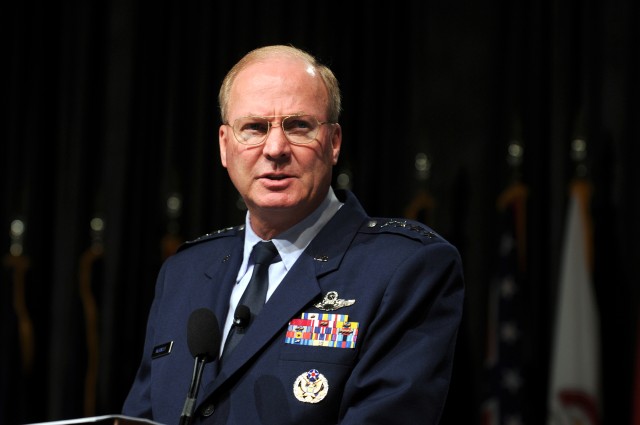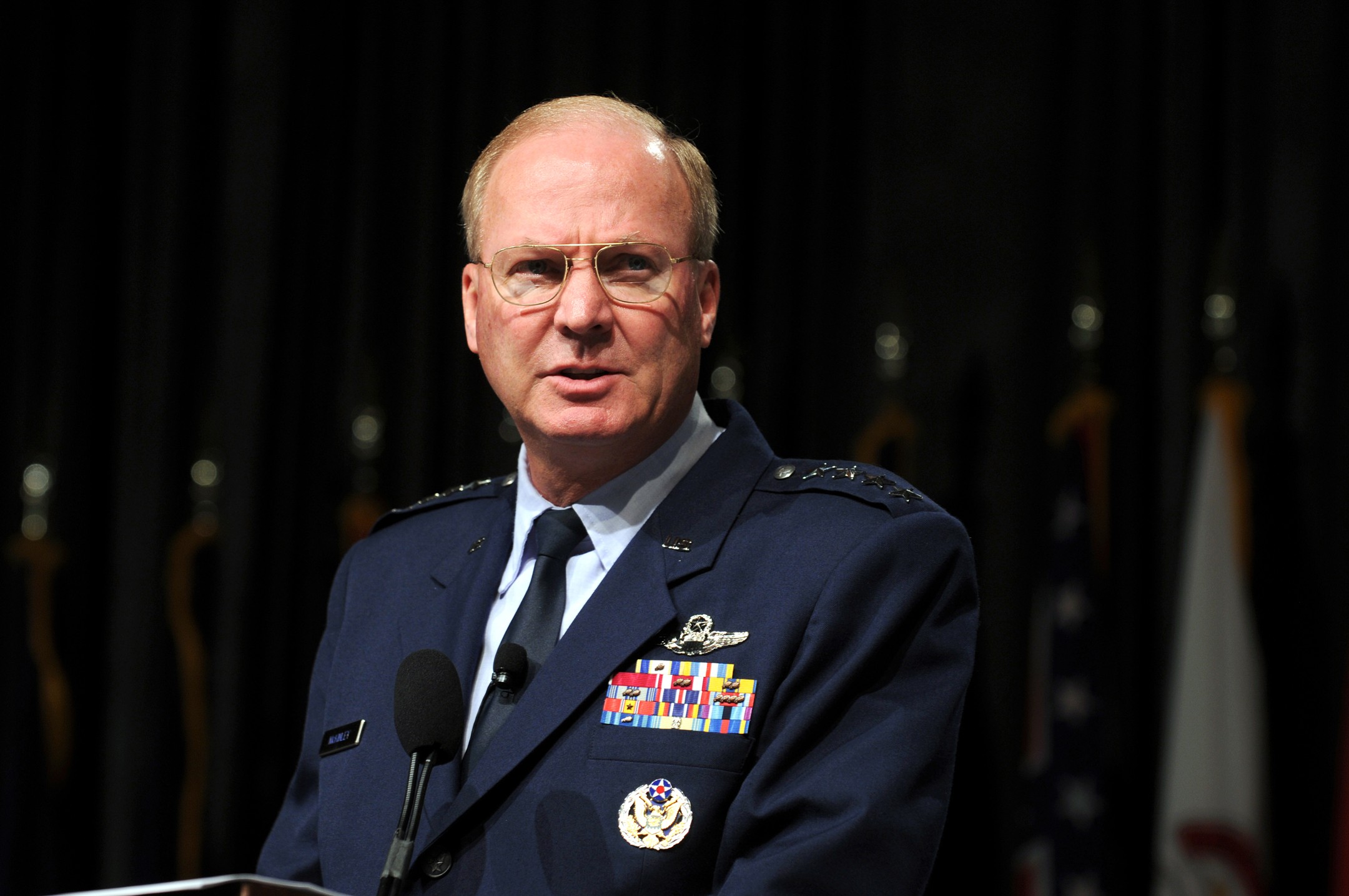
AUSTIN, Texas (Aug. 23, 2010) -- Civilian and military leaders said here on Saturday that the National Guard is America's solution in a time of constrained budgets, increased missions and the necessity of developing greater partnership capacity.
"The National Guard has repeatedly proven itself to be ready and a very accessible force," Air Force Gen. Craig McKinley, the chief of the National Guard Bureau, told about 5,400 people attending the 132nd general conference of the National Guard Association of the United States here this week.
"We validated the Total Force concept by showing that the men and women in our formations are ready to answer the call to be mobilized, to deploy overseas, to return home and then to become prepared to do it all over again," he said.
"We ... are facing a potentially momentous year," Dennis McCarthy, the assistant secretary of Defense for Reserve Affairs said. "There are going to be some decisions made this year that will have significant impact on the way the young men and women, who are wearing the uniform right now and those who will follow them are going to serve over the next couple of decades."
Leaders sketched a picture of an environment in which budgets will be tight, the operational tempo will remain high and the Defense Department is looking for ways to boost partnership capacity worldwide.
"We've got challenging times ahead," McKinley said.
All agreed on three key points: The National Guard has reached a peak of excellence since a transformation that began, arguably, with Desert Storm/Desert Shield and certainly since the 9/11 attacks.
Although senior level discussions and a dozen studies are underway about the future of the Guard and Reserve, no one wants to see it return to the Cold War-era strategic reserve.
And the National Guard is a key part of America's solution to changing times. "We are one of the most efficient, effective organizations in our nation today," McKinley said.
"We as a Guard are exactly where we want to be in these critical times," said Air Force Lt. Gen. Harry Wyatt, director of the Air National Guard. "We have the right message. That message has been provided to us by our Soldiers and our Airmen in the magnificent work that they have done since 9/11."
Texas Gov. Rick Perry offered his perspective as a commander-in-chief for one of the 54 state and territories.
"I'll keep calling for the Guard, because I know you'll get the job done and done right," he said.
He then posed a question: "I wonder if any force is able to adapt as well as the Guard can' On any given day, you might be filling sandbags as rising floodwaters threaten your hometown, mounting patrols in a combat zone overseas or doing the countless drills and exercises required to maintain readiness."
Leaders stressed the strengths of the National Guard lie in a vital balance of Guardmembers, families, employers, communities, contractors and associations.
"No matter what your connection to the Guard, the fact remains that you are making a difference," Perry said. "You play a role in making our state safer projecting power around the globe and defending the freedom that is a part of our nation's DNA."
"Maybe for the first time in our 364 years, we're more operational than we've ever been for a sustained period," McKinley said. "The use of the National Guard has never been more extensive."
Yet despite the high operational tempo and after a decade dominated by overseas contingencies, recruiting is at a high.
"Every man and women who's serving in uniform today ... either enlisted or re-enlisted since 9/11" McCarthy noted. "They made a conscious choice to serve under the conditions that we are in today."
The Army National Guard's congressionally-authorized end strength is 358,200. The actual number of Citizen-Soldiers is 362,847. Of those, 41,392 are either deploying, in theater or returning from deployment today.
Excluding new enlistees in the training pipeline, some 60 percent of Citizen-Soldiers wear the right shoulder patch symbolizing experience in a combat environment.
"We are actually turning people away from our organization," said Army Maj. Gen. Raymond Carpenter, the acting director of the Army National Guard. "Who would have guessed that almost nine years into two wars we would have a volunteer Army that is turning people away'"
The situation is a stark contrast to the draftee era, said Carpenter, whose lengthy military career includes Vietnam-era service.
Meanwhile, as a measure of readiness, 92 percent of Citizen-Soldiers are qualified in their military occupational specialty. "I can remember when we struggled to get to 70 percent," Carpenter said. "We in the Army National Guard don't need to take a back seat to anybody."
McKinley highlighted several National Guard programs, including Youth ChalleNGe, which will graduate its 100,000th at-risk youth this year. "We are turning lives around and doing it effectively, safely and economically," he said.
The 62-nation State Partnership Program is one of the National Guard's contributions to increased partnership capacity. "It is a crown jewel in the National Guard enterprise," McKinley said.
"Some of you will live to the 400th birthday of the National Guard," he said. "We're going to have to continue to transform. We're going to have to continue to make good use of the resources that we get. We're going to have to sustain our equipment. We're going to have to train the young men and women who make our National Guard one of the finest organizations in the world."
Perry compared the current generation of warriors to those who served in World War II.
"Commentators have called the men and women who fought in World War II the 'greatest generation,' and they were right to do so," he said. "However, this decade of engagement in the war on terror and our armed forces' high level performance are introducing America to a new 'greatest generation.'"
"Of course, the reward for competence is more work and our Guard has overcome every challenge with the usual combination of enthusiasm, skill and perseverance."
"The Citizen-Soldiers and -Airmen of your National Guard are adding value to America every day," McKinley said. "Your National Guard is engaged across the full spectrum of operations .... We can do 40,000 to 50,000 Soldiers in a predictable rotational cycle for as long as we need to. If we have predictability and stability, we can do this for our nation for as long as they need us."
"If the Guard can be sure of one thing, it's that the phone will ring, and that your states and our nation will continue to rely on you," Perry said. "As governor, I never hesitate to make that call, because you're always responsive always ready and always raring to go as 'America's Solution.'"
The conference host, NGAUS, includes thousands of current and former Guard members. It was created in 1878 to provide unified Guard representation in Washington with the goal of obtaining better equipment and training by petitioning Congress for more resources, the same mission it has today.

Social Sharing